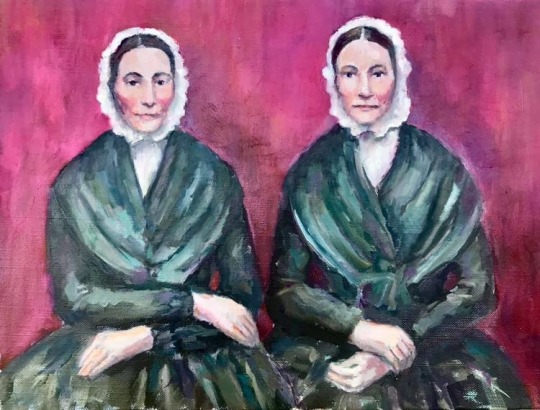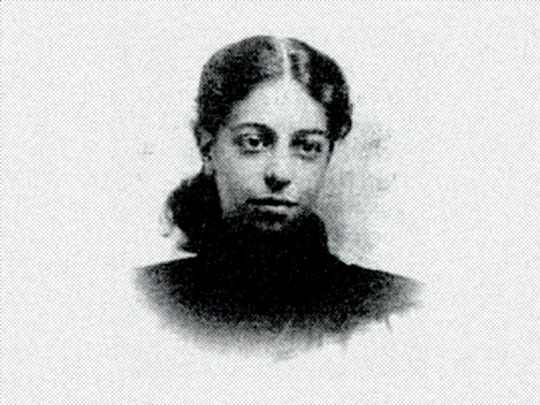#angelina grimké
Explore tagged Tumblr posts
Text

The Grimké Sisters by Allison Adams
Sarah Moore Grimké (1792–1873) and Angelina Emily Grimké (1805–1879), known as the Grimké sisters, were writers, orators, and educators—the first American female advocates of abolition and women's rights. Breaking from the southern slaveholding family they were born into, they chose to become Quakers, where, as women, they were allowed to speak out against slavery and for equal rights.
#the Grimke sisters#the grimké sisters#allison adams#Sarah grimke#Angelina grimke#Sarah grimké#Angelina grimké#art#artwork#herstory#women in history#irl women/girls
12 notes
·
View notes
Text
At the time the Grimké sisters set off on their speaking four of New England in 1837, many sectors of the New England churches had already been long-standing supporters of colonization societies, and at first the sisters received a warm welcome. Indeed, what better appeal could there be than the living witness of two women from a prominent Southern family who had personally observed the horrors of slavery and who now denounced the institution as sinful? They were tangible demonstrations that the tactical campaign launched by the abolition societies was a good one. If Southern women could have a change of heart and mind on the issue, then surely Northerners could be easily won to the same persuasion. But the Grimké sisters went beyond denouncing slavery as sinful; they spoke against race prejudice as an indirect support of slavery, insisting that such prejudice had to be fought in the North as well as the South. Angelina argued that the female slaves
“are our countrywomen; they are our sisters; and to us as women, they have a right to look for sympathy with their sorrows and effort and prayer for their rescue.”
To denounce slavery as sinful was one thing; to call on Northern Protestants to rid themselves of race prejudice was a rather strong idea to many New Englanders. Before the year was out, the Congregationalist ministers were refusing to read notices of abolitionist meetings from the pulpit.
During their Boston stay the sisters were clearly influenced and encouraged by Garrison to strengthen the positions they had espoused at the beginning of their tour. They quietly emphasized the point in their lectures that if women were to become effective in the abolition movement, they had to free themselves from the social restraints that had kept them numb and silent and learn to speak and act as fully responsible moral beings. Many people, clergymen in particular, were very skeptical of, if not openly hostile to, this view of women in the abolition movement. Garrison seems to have taken the discord as an opportunity to denounce the clergy and to identify himself as a strong supporter of woman's rights. It is difficult to be sure of the distribution of views within the abolition movement concerning the stress on woman's rights by antislavery agents, for G. H. Barnes (1957), one of the chief historians of this movement, is so clearly critical of Garrison that one must look cautiously beyond his textual account to the evidence itself, and that is ambiguous. The correspondence between Weld and Angelina Grimké makes it is clear that Weld was eager to open the leadership of the movement to women, since they could reach other women more effectively than men could. Angelina seemed to become increasingly convinced that there was a need to mobilize the reservoir of antislavery sentiment and potential for action among women in more general terms. Since the sisters were speaking many times a week as they toured New England, they were in the throes of an intensive process of politicization themselves, and much of the assurance with which they now wrote and defended their ideas was probably rooted in this experience. But Weld advised caution without departing from his principled support for women. Other officers of the society used a much sharper tone in their letters to the women. Whittier asked how they could forget "the great and dreadful wrongs of the slave in a selfish crusade against some paltry grievance . . . some trifling oppression, political or social, of their own" (Barnes 1957: 157).
Despite the warnings from abolition society officials, Sarah continued her work on a series of letters on the equality of the sexes and on her response to the angry pastoral letter that denounced "the mistaken conduct of those who encourage females to bear an obtrusive and ostentatious part in measures of reform" (Barnes 1957:156).
-Alice S. Rossi, The Feminist Papers: From Adams to de Beauvoir
#Alice Rossi#Angelina grimké#Sarah grimké#us history#amerika#abolitionist history#womens history#racism#sexism#the more things change the more they stay the same
20 notes
·
View notes
Text
36/2023: Sarah Mapps Douglass, 9. September 1806
"Es ist wahr, das Klagen der Gefangenen drang manchmal an mein Ohr mitten in meinem Glück, und ließ mein Herz bluten für sein Unrecht; doch, ach! der Eindruck war so flüchtig wie frühe Wolken und der Tau am Morgen."
By Sarah Mapps Douglass (1806-1882) – The Library Company of Philadelphia, Public Domain Die Eltern von Sarah Mapps Douglass waren afroamerikanische Quäker und Abolitionisten in Philadelphia, Pennsylvania; ihr Vater Robert Douglass war Bäcker(Wiki) oder Friseur(1), die Mutter, Grace Bustill Douglass, Hutmacherin und Lehrerin. Ihr Großvater mütterlicherseits, Cyrus Bustill, war ebenfalls bereits…

View On WordPress
#abolitionismus#aktivistys des intersektionalen feminismus#angelina grimké#cheyney university of pennsylvania#female literary society#frauenfiguren#free african society#kalender#lucretia mott#mint-fächer#quäker#sarah grimké#sarah mapps douglass#sklaverei#the liberator#william lloyd garrison
1 note
·
View note
Text
Ok this is probably the most romantic thing I have ever heard said to anyone. So abolitionist and women's rights activist Angelina Grimké was writing to her would be future husband Theodore Weld and asked him why he did not like her. He responded with this, "You are full of pride and anger. And I have loved you since the first time I saw you." So the pride and anger thing was probably a reference to how involved she was in trying to end slavery and gain equal rights for women since she put all her efforts into that to deal with the loss of her cousin Elizabeth. Theodore Weld was also very involved in the abolitionist movement and would often encourage Angelina in her activism and even arranged for her to speak more at lectures. However she still didn't think he liked her which was probably due to some self doubt and if someone said this to me after I asked why they didn't like me I would marry them in a heartbeat and it's no wonder they were married only three months later.
1 note
·
View note
Text

Angelina Weld Grimké (deceased)
Gender: Female
Sexuality: Lesbian
DOB: 27 February 1880
RIP: 10 June 1958
Ethnicity: African American, white
Nationality: American
Occupation: Journalist, writer, teacher, playwright, poet
Note: First African-American women to have a play publicly performed.
#Angelina Weld Grimké#Angelina Weld Grimke#lgbt history#black history#lgbt#female#lesbian#1880#rip#historical#poc#black#biracial#african american#journalist#teacher#playwright#poet#first#popular#popular post
157 notes
·
View notes
Text

25 notes
·
View notes
Text

#writers and poets#poets on tumblr#poem#poetry#angelina weld grimké#the puppet-player#poetic#aesthetic#literature#academia
4 notes
·
View notes
Text

♡ ♡ ♡ ♡ ♡ ♡ ♡
#leitura#Audre Lorde#Maya Angelou#bell hooks#Alice Walker#Angelina Weld Grimké#Gwendolyn Bennett#Gwendolyn Brooks#Jayne Cortez#Amina Baraka#Lucille Clifton#Nikki Giovanni#Pat Parker#June Jordan#Cheryl Clarke#Nikky Finney#Wanda Coleman#Harryette Mullen#Rita Dove#Sonia Sanchez#poesia
9 notes
·
View notes
Text

5 notes
·
View notes
Text
Twin stars through my purpling pane, Two shriveling husk Of a yellowing moon on the wane— And the dusk.
Dusk by Angelina Weld Grimké
6 notes
·
View notes
Text

Angelina Weld Grimké (February 27, 1880 – June 10, 1958) was an African-American journalist, teacher, playwright, and poet.
By ancestry, Grimké was three-quarters white — the child of a white mother and a half-white father — and considered a woman of color. She was one of the first African-American women to have a play publicly performed.
0 notes
Text
🌼 poems that held my hand in may 🌼
Nocturne, Li-Young Lee
Your Name, Vahan Tekeyan
Sonnets to Orpheus 2;29, Rainer Maria Rilke
I stopped going to therapy, Clementine von Radics
Miyazaki Bloom, Nina Mingya Powles
The Quiet Machine, Ada Limón
When we two parted, Lord Byron
Fragment, Amy Lowell
The Want of You, Angelina Weld Grimké
When Did It Happen?, Mary Oliver
Alone, Sara Teasdale
Peace XVIII, Khalil Gibran
#may#poetry recs#poems#literature#classic literature#translated literature#li-young lee#rainer maria rilke#vahan tekeyan#clementine von radics#nina mingya powles#ada limón#lord byron#amy lowell#mary oliver#sara teasdale#khalil gibran
712 notes
·
View notes
Text
Theodore Weld—later to become Angelina Grimké’s husband—and at this stage the quasi-employer, and advisor of the Grimké sisters, felt that ‘as did most of the leaders of the Anti-Slavery Society, the woman's rights issue threatened the concentration of reformers on the anti-slavery cause. Weld regarded the subject in the same light as he might the "peace" issue or the Graham diet—as a side issue which the enemies of abolition might seize on, in order to distract reformers from their main goal’ (Lerner, 1971, p. 199).
Characteristic of the response to women's protest across the centuries is the assertion that the time is not yet ripe, that there are other issues that are more important, and that the ‘woman question’ will be settled after this particular revolution, or war! Women have consistently been urged by men to abandon the luxury of fighting for the female half of humanity in order to fight for the more pressing problems of the male half. Even the problem of slavery was considered a male problem, with female slaves sharing the same fate of invisibility as their sisters.
While Weld—generously—admitted the justice of the cause and unequivocally stated that women could participate in the public realm, he deeply regretted that the sisters had taken to talking and writing about women's rights for: ‘Writing of this sort was something any woman could do. But in their function as female anti-slavery speakers they were unique. He asked them to let others do the lesser work (that is, women's rights work) let them do the work they were best qualified to do’ (ibid., p. 200).
-Dale Spender, Women of Ideas and What Men Have Done to Them
#dale spender#womens rights#feminist history#anti slavery#womens history#Sarah grimké#Angelina grimké
16 notes
·
View notes
Note
Hi! Would it be okay to ask for poems that radiate some kind of "red" energy? I saw your recommendations about the similar ask with blue and I really loved it, so I thought I could ask for more :)
Red and blue, twin poles of the world 💘I had to think about this one (red has a distinct vibe for me) but I think all of these feel "red" when I read them, in one form or another, if not always overtly, so I hope you enjoy them, too:
"In the Desert" by Stephen Crane
"Woman Unborn" by Anna Swir
"El Beso" by Angelina Weld Grimké
"What Do Women Want?" by Kim Addonizio
"For You" by Kim Addonizio
"I'm Explaining a Few Things" by Pablo Neruda
"Dirty Valentine" by Richard Siken
"Little Beast" by Richard Siken
"Aubade" by Miller Williams
"Green and Gold" by Rachel Hadas
"Ishtar Awakens in Chicago" by Mohja Kahf
"The Second Coming" by W.B. Yeats
"O" by Dunya Mikhail
"Center of the World" by Safiya Sinclair
"[i like my body when it is with your]" by e.e. cummings
"[your little voice]" by e.e. cummings
"Frida Kahlo to Marty McConnell" by Marty McConnell
"Complaint of Achilles' Heel" by Charles Jensen
"What a Cyborg Wants" by Franny Choi
"A Moment" by Saadi Youssef
"And After That" by Lorca
"Harlem" by Langston Hughes
"Lamenting Widow" by Ho Xuan Hong
"The Unicorn" by Angela Carter
"Dulzura" by Sandra Cisneros
"The Story of Madame Chevalier" by Ciarán Carson
"The Witch Has Told You a Story" by Ava Leavell Haymon
266 notes
·
View notes
Text
Today in Christian History

Today is Friday, June 21st, 2024. It is the 173rd day of the year in the Gregorian calendar; Because it is a leap year, 193 days remain until the end of the year.
431: When they discover that Patriarch Cyril of Alexandria intends to open the Council of Ephesus without waiting for the arrival of Patriarch John of Antioch, who is supposed to be its president (John has been delayed by flooding), bishops of the East sign a formal act demanding delay. Cyril will ignore them and condemn Patriarch Nestorius of Constantinople because of his christology and order John to break communion with him.
1579: Francis Fletcher, chaplain to Sir Francis Drake, reads from the Anglican Book of Common Prayer somewhere in California on “the first Sunday after Trinity”—the first time the English prayer book is known to have been used in the New World. A number of Indians gather to watch. Captain Drake's rough sailors, who have just plundered their way up the Spanish coast, lift their hands to heaven and pray God to open the eyes of the Indian idolaters “to the knowledge of him and of Jesus Christ the salvation of the Gentiles.”
1663: The men of Groton, Massachusetts, vote to make Samuel Willard their pastor “for as long as he lives.” Several years later an Indian raid will destroy the town and Willard will move to Boston where he will rise in prominence.
1691: John Flavel, a godly pastor in Dartmouth, England, preaches his last sermon, taking as his text 1 Corinthians 10: 12 “Wherefore let him that stands take heed lest he fall,” urging those who are careless of their Christian profession to show a deeper concern for their souls. He had written books urging full committment to Christ and was known for his passion in prayer. For instance, once learning that a sea battle was in progress and knowing that many Dartmouth boys were in the navy, he led his people in prayer and fasting. Not one of Dartmouth’s many sailors died.
1834: (pictured above) Cyrus McCormick, a Christian inventor and businessman from Virginia, patents the world’s first truly workable reaper. He will make a fortune from it, much of which will go to charity.
1837: Angelina Grimké addresses a large “mixed” audience of men and women in Boston, Massachusetts, the onset of bringing many women into active participation in the movement to abolish slavery, but also conclusively repulsing gender discrimination in her lectures.
1846: Death of Isaac McCoy, a missionary to American Indians. McCoy and his family had endured great privation and hardship in their pioneer life. He had been criticized for urging the transfer of Indians from their ancestral lands, but his writings show he was concerned they were being corrupted by contact with whites.
1853: The First Congregationalist Church in Chicago burns to the ground. Set ablze by enemies because of its opposition to slavery. The Congregationalists will dedicate a new, bigger church building just four months later.
6 notes
·
View notes
